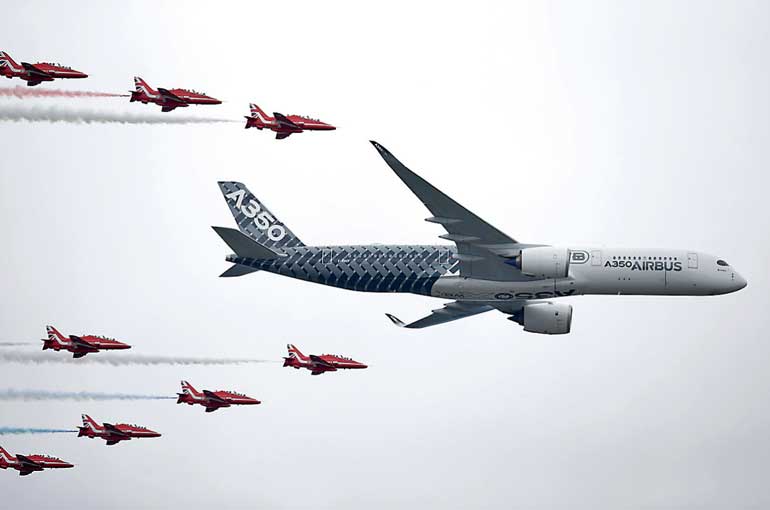Tuesday Feb 17, 2026
Tuesday Feb 17, 2026
Monday, 18 July 2016 00:00 - - {{hitsCtrl.values.hits}}
 An Airbus A350 aircraft flies in formation with Britain’s Red Arrows flying display team at the Farnborough International Airshow in Farnborough, Britain 15 July - REUTERS
An Airbus A350 aircraft flies in formation with Britain’s Red Arrows flying display team at the Farnborough International Airshow in Farnborough, Britain 15 July - REUTERS
FARNBOROUGH, England (Reuters): Airbus sought to reassure investors on Wednesday that its decision to cut production of the world’s biggest passenger jet, the A380, would not badly hurt the group, while bracing for fresh losses on a second flagship European project.
Doubts over demand for the double-decker A380 and more cost overruns on the A400M military airlifter overshadowed fresh jet orders as the two planes, developed at a combined cost of 35 billion euros, flew under grey skies at the Farnborough Airshow.
Airbus Group CEO Tom Enders said the company remained optimistic about long-term prospects for the 544-seat A380, and hoped to return to higher levels of output in the years ahead.
“I hope that this is only a year or two and then we can raise production rates again,” he told reporters at the show.
Enders was speaking a day after Airbus cut its target for A380 deliveries to 12 a year from 2018, from 27 in 2015 and well below its current breakeven point, due to weak demand.
The reduction deals a blow to one of Europe’s biggest and most expensive industrial projects.
“This can only be a modest surprise given the weak order intake in recent years and may reflect one or two recent sales campaign losses or postponements,” said Harry Breach, aerospace analyst at Raymond James.
Reuters reported last month that doubts were growing over an order for 12 of the jets from Iran.
Although Airbus insists the A380 is “here to stay,” industry sources say the project is effectively in a strategic holding pattern while Airbus takes advantage of low oil prices to defer decisions on whether to invest more or let it fade away.
Airbus and US rival Boeing have enjoyed years of booming sales, driven by rising air travel and demand for new fuel-efficient planes.
But risks to the global economy, from slowing growth in China to Britain’s decision to leave the European Union, have caused sales to diminish and analysts are worried some of the industry’s record order backlog could be deferred or cancelled.
Airbus said however it did not expect a wave of order postponements.
So far at the Farnborough show, the industry’s showcase event, Airbus and Boeing have announced combined business worth more than $ 60 billion. But that includes deals that confirmed preliminary agreements, and is below the more than $ 100 billion of business they closed at last year’s sister event in Paris.
Boeing executives raised doubts over the sustainability of some of the orders announced by rival Airbus, but the European company said it was building a solid backlog of business.
Potential charges
Jefferies analysts said they had already been expecting the A380 to make a loss, before research and development costs, of 250 million euros in 2018, 300 million in 2019 and 350 million in 2020.
Enders said Airbus would strive to break even on the A380 at lower rates of production. “How far we can bring it down, we will have to see,” he said.
The chief executive of the group’s planemaking unit, Fabrice Bregier, said it had identified ways to cut costs and any losses from the programme would not have a material impact on the group.
Each A380 is worth $ 432.6 million at list prices, but after discounts it would sell for significantly less.
Sales of large four-engine airliners such as the A380 have been hit hard by improvements in the range and efficiency of smaller two-engined models, which can be easier to fill.
The trend became starker on Monday when one of the mammoth plane’s earliest advocates, Richard Branson’s Virgin Atlantic, opted for 12 of Airbus’s A350-1000 twin-engined jets after progressively shelving its long-standing order for A380s.
In another blow, Airbus finance chief Harald Wilhelm said on Wednesday the company was likely to take a fresh charge in first-half results later this month for the latest problems involving its A400M military transporter.
Problems that the company partially blames on the gearbox of the aircraft’s large turboprop engines have disrupted deliveries of the already delayed military plane and driven up costs.
Wilhelm, who gave no indication of the size of the potential charge, said there was also a risk of charges related to loss-making contracts for the A350 jetliner, but that these would not affect the aircraft’s overall breakeven target.Analysts expect A400M charges of some 1.5 billion euros.